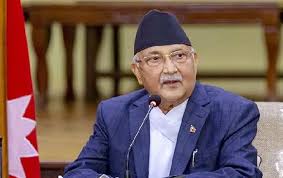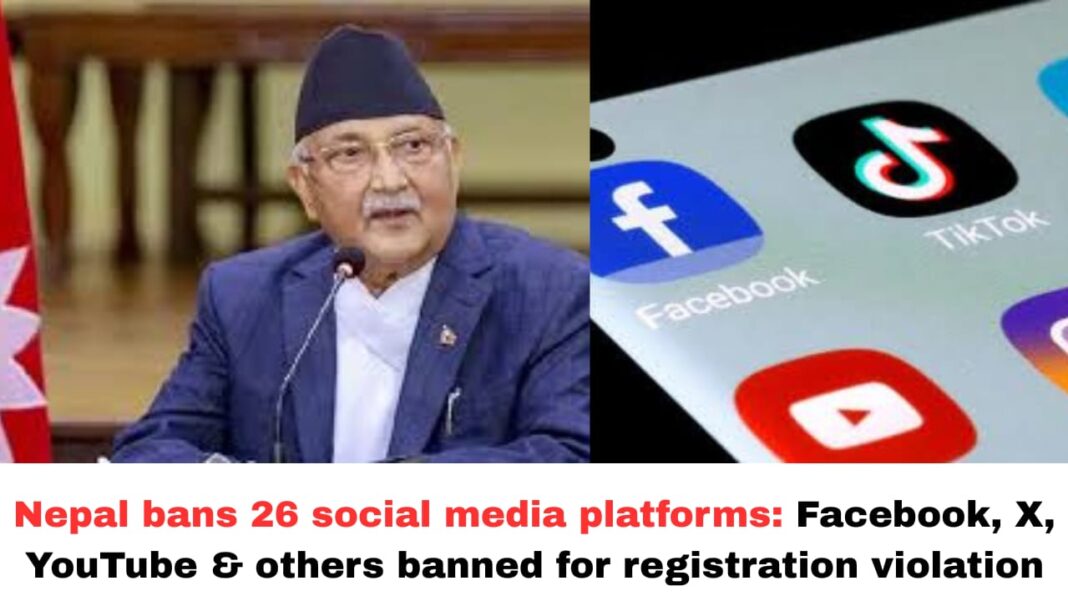Digital News Guru National Desk:
Nepal’s Digital Shutdown: Blocking Social Media Over Registration
In a dramatic escalation of internet regulation, Nepal’s government has ordered a nationwide ban on 26 major social media platforms, including Facebook, Instagram, X (formerly Twitter), YouTube, WhatsApp, and LinkedIn. The move comes after these platforms failed to comply with a Supreme Court directive to formally register with the authorities. Only a handful of apps—including TikTok, Viber, WeTalk, Nimbuzz, and Poppo Live—remain accessible, having completed the required registration.

Legal Backdrop and Regulatory Push
The ban stems from a ruling by Nepal’s Supreme Court urging that all social media platforms—domestic or foreign—register with the Ministry of Communications and Information Technology before operating in the country. This registration mandate was intended to curb the spread of harmful content and fake identities by establishing oversight mechanisms.
In practice, platforms were given a seven-day grace period from August 28 to register. When global giants like Meta and Alphabet failed to comply by the deadline, the Nepal Telecommunications Authority (NTA) was instructed to deactivate their access.
The directive mandates platforms to appoint local contacts, grievance redressal officers, and self-regulation supervisors. Authorities argue such accountability is necessary to combat cybercrime, misinformation, and social unrest.
Platforms Affected: Who’s In, Who’s Out
Nepal’s Ministry of Communications has published lists of platforms that remain active versus those now blocked:
- Allowed (registered): TikTok, Viber, Nimbuzz, WeTalk, and Poppo Live.
- In process: Telegram and Global Link.
- Blocked: Facebook, Messenger, Instagram, WhatsApp, YouTube, X, Snapchat, Reddit, LinkedIn, Pinterest, Signal, Discord, Quora, Threads, Clubhouse, Tumblr, and more—totaling 26 platforms.
Government’s Justification vs. Rights Concerns
Official Rationale
Minister Prithvi Subba Gurung defended the crackdown, stating the platforms were repeatedly requested to register and failed to comply—forcing the government’s hand. He emphasized the need to “avoid platforms becoming malicious” and to ensure accountability within Nepal’s jurisdiction.
Criticisms and Risks
Media rights organizations see the ban as a dangerous erosion of freedom of expression and press. The Committee to Protect Journalists (CPJ) warned it sets a “dangerous precedent” for press freedom and access to information.

Civil society and opposition leaders have echoed concerns, arguing that regulation is valid—but not through sudden bans that disrupt civic life. Hit Raj Pandey, chief whip of the opposition CPN (Maoist Centre), cautioned that the shutdown could plunge the country into chaos.
Broader Impacts: Society, Business, and Digital Rights
- Connectivity & Social Impact
Social media is a lifeline for Nepalis—especially those with families abroad. Its sudden removal may increase feelings of isolation, stress, and loneliness among migrant workers and their loved ones. - Economic Disruption
SMEs, startups, and informal businesses heavily rely on Facebook and Instagram for marketing and sales. Their absence could severely impair livelihoods, stifle entrepreneurship, and undermine economic growth. - Educational & Networking Setbacks
Platforms like YouTube and LinkedIn provide indispensable resources for learners and professionals. Blocking them cuts off access to educational content and career opportunities. - Cybersecurity Risks & VPN Surge
As users seek workarounds via VPNs and alternate DNS, authorities warn of increased cybersecurity threats. Free VPN services may harvest sensitive data, and the sudden bandwidth shift could slow overall internet performance. - A Threat to Digital Vision and Investment
Nepal’s ambition for a “digital Nepal” may take a serious hit. The ban could deter foreign tech investment and undermine confidence in the government’s digital policy coherence.
Historical Context and Ongoing Legislative Debate
Nepal’s attempt to regulate social media is not new. In November 2023, TikTok was banned for disrupting social harmony. It was later reinstated in August 2024 after agreeing to local registration and oversight.
The Social Media Regulation Bill of 2081 (2025) remains a focal point of contention. The proposed law carries fines and jail terms for spreading misinformation and mandates stringent oversight of platforms and users. Critics argue the clauses are vague and could be misused to curb dissent.

Some content creators are vocal in opposition—lamenting how new regulations are threatening free expression and digital creativity.
Conclusion: A Balancing Act with High Stakes
Nepal’s decision to forcibly block unregistered social media platforms reflects a tough line on digital regulation—driven by concerns over online harm, misinformation, and accountability. While the government frames this as a necessary move for national security and governance, critics warn it strains democratic norms and disconnects citizens from global digital life.
The future now hinges on whether Nepal can strike a more flexible, transparent path: one that balances user rights, legislation, and oversight—without resorting to heavy-handed bans that risk silencing voices and businesses across the nation.
You May Also Read: NH-2 Reopens as Manipur Signs Suspension of Operations Deal








